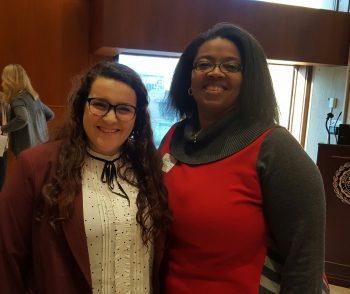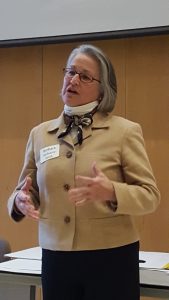Presented by Chester County Fund for Women & Girls
By Eliza Mohler, Staff Writer, The Times

Lilah Saber and Juliana Mosley smile after their presentations at the Yes, All Women! event Thursday at West Chester University.
WEST CHESTER – March is women’s history month, and at West Chester University Thursday, women of all ages, races and backgrounds gathered to discuss how they can learn from their own histories and create their collective future.
The discussion, called “Yes, All Women!” was hosted by Chester County Fund for Women & Girls and featured three speakers: educational consultant Juliana Mosley, WCU student Lilah Saber and former PA State Representative, Barbara McIlvaine Smith.
The goal of the event was to ensure that the voices of women of all ages are heard, and to discuss how women can leverage commonalities rather than stand divided because of differences.
“Tonight reflects the heart of our organization as we come together toward progress,” said Michelle Legaspi Sanchez, the fund’s executive director, as she welcomed all of the attendees.
During her presentation, Mosley gave an in-depth review of generational differences between living women, starting with the Greatest Generation (those born between 1910 and 1924) up through the most recent generation that includes adult women, which is commonly referred to as Generation Z (those born between 1996 and 2010). Mosley highlighted the traits of each generation that make them different from the others, including the tendency of Baby Boomers and members of Generation X to be workaholics, whereas many members of the Millennial generation have a different work style that often allows them to multitask faster than other generations.
Saber, who is studying social work, youth empowerment and urban studies at WCU, reviewed the history of the women’s movement, starting with Elizabeth Cady Stanton in the late 1800s and Susan B. Anthony and Margaret Sanger in the early 1900s. She then explained the movement’s evolution through the 1960s and 1980s into the present, and she mentioned the concept of intersectionality, as introduced by Kimberlé Crenshaw in 1989, as being at the forefront of the modern women’s rights movement.
“I would argue that we are starting a new era of women’s rights,” Saber said. “I am a middle-class Millennial Middle Eastern woman, and I can’t separate those.”

Former PA State Representative Barbara McIlvaine Smith leads a group discussion about the meaning of feminism at the event presented by the Chester County Fund for Women and Girls
McIlvaine Smith started her part of the discussion by inviting the approximately 50 attendees to break into small groups of six to eight people. The members of each group were then asked to share what they thought made them unique as women, what commonalities they might all share and what the word feminism means to them. After the small group discussions concluded, McIlvaine Smith asked a representative from each group to share the findings with the larger audience, which led to a lively discourse that highlighted different perspectives on women’s rights, including why some of the attendees do not view themselves as feminists, and why it is important for white cisgender women to stand up for the rights of both trans women and women of color.
“We’re all daughters of someone,” McIlvaine Smith said. “And the daughters have to join hands and feel their power.”
Chester County Fund for Women & Girls leads and unites the community through philanthropy and advocacy to ensure that women and girls have resources and opportunities to live and thrive. Additional information about the Fund and its work can be found at www.ccfwg.org.






